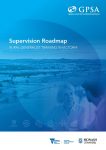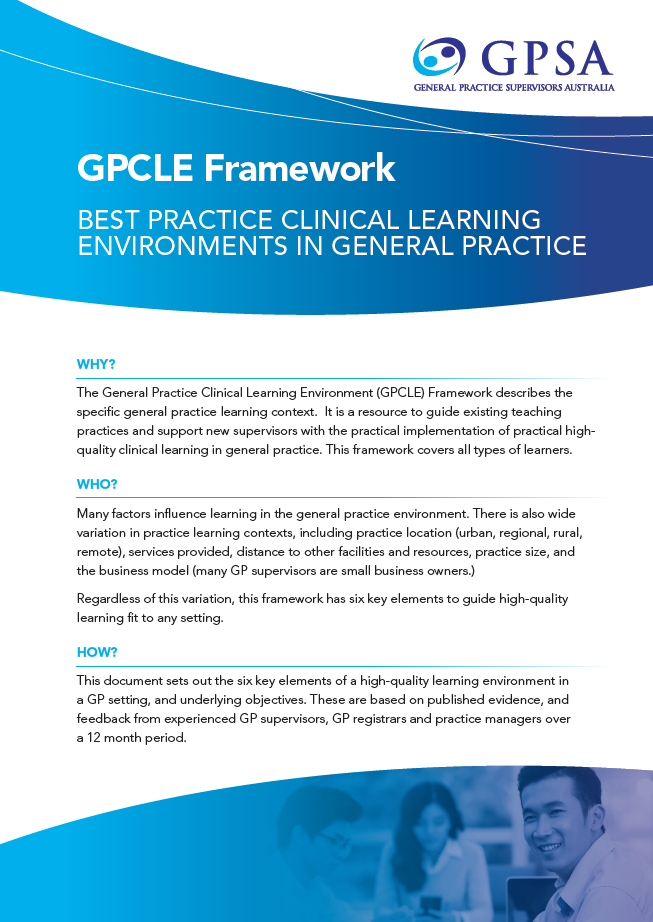Research
Research themes
Ongoing Project – The pursuit of excellence in GP/RG training: the GPCLE tool
In 2019, GPSA led the development of a consensus-based framework for the GP Clinical Learning Environment (GPCLE) setting out six elements describing excellence in the clinical learning environment.
Through co-design and consensus-building with GP training stakeholders, and supported by a competitive RACGP Education Research Grant, GPSA translated the GPCLE framework into an evidence-based quality improvement GPCLE tool (read our Project Report here).
Translating the GPCLE framework into the GPCLE tool

The GPCLE quality improvement tool
The tool provides the GP training sector with an evidence-based means by which to showcase the quality of the clinical learning environment in GP training practices and identify areas for improvement.
What | 11 items, mapped to the GPCLE Framework |
Who | All GP training practice personnel, including medical learners |
How | Self-assessment of qualifty,using objective evidence, across a performance continuum |
When | Annually or bi-annually |
Where | In Gp training practices |
Why | To measure, improve, monitor and showcase quality in the GP clinical learning environment |
GPSA is working with our partners and industry stakeholders – both national and international –to translate the GPCLE tool into practice and policy along the GP training pipeline.
Recent Project – Reciprocal Vulnerability
The aim of this project is to explore how self-disclosures and concealments about professional and personal matters influence the GP supervisor-registrar relationship.
The supervisor-registrar relationship is the foundation for successful training in general practice, which is underpinned by mutual trust and respect. Mutual willingness to disclose areas of professional or personal uncertainty can deepen the supervisor-trainee relationship and foster learning opportunities.
Findings from this project have been presented at key industry conferences (e.g., Reveal or conceal? and Brave enough?)
Findings and practical implications will be disseminated via a GPSA webinar and manuscript in 2025.
RESEARCH TRANSLATION
2022 National Survey Report
2022 National Survey Report

According to GPSA’s national survey of its members, GP supervisors who feel well-supported in their workplace, avoid working when unwell, and practise self-care have lower levels of burnout and are more likely to remain in GP training for the next 5 years.
GPSA surveyed GP supervisors in March-April 2022 and found that over 70% of GP supervisors had high levels of burnout, which was associated with lower levels of engagement in selfcare activities (including professional support, professional development, life balance, cognitive awareness, and daily balance). Younger GP supervisors were at greater risk of burnout.
Working while unwell and the belief that selfcare/wellbeing could be better supported in the workplace predicted high levels of burnout. In contrast, GP supervisors who intended to supervise for the next 5 years and were engaged in professional development were much less likely to experience burnout.
Supervision Roadmap: Rural Generalist Training in Victoria
Supervision Roadmap: Rural Generalist Training in Victoria
Led by GPSA in collaboration with Monash University and the Victorian Rural Generalist Program(VRGP), this rapid study aimed to explore and expand on existing evidence about rural supervision to meet the learning needs of the RG2 group across the VRGP curriculum. It specifically focused on three rural regions of Victoria: Hume, Loddon Mallee, and Barwon South West. The data obtained through surveys and one-on-one interviews with dozens of participants from primary and acute healthcare, and individuals with valuable experience in remote supervision, was used to develop a Supervision Roadmap to guide the implementation of high-quality supervised learning across the core generalist curriculum in regional Victoria.

Click here to download the extensive report for this project, which has since been cited in several Commonwealth policy documents.
Corresponding publications:
O’Sullivan BG, Martin P, Taylor CJ, Lodding M, Bilardi G, Dix L, Phillips J, Hutchinson M, Van Wollingen R, Wallace G. Developing supervision capacity for training rural generalist doctors in small towns in Victoria. Rural and Remote Health 2022; 22: 7124. https://doi.org/10.22605/RRH7124
Martin, P., O’Sullivan, B., Taylor, C. et al. Blended supervision models for post-graduate rural generalist medical training in Australia: an interview study. BMC Med Educ 22, 478 (2022). https://doi.org/10.1186/s12909-022-03529-x
GP Clinical Learning Environment Framework
GP Clinical Learning Environment Framework
GPSA has develeoped the GPCLE as a framework to guide continuous quality improvement of the practice learning environment. The GPCLE has been adapted for general practice training environments from the Best Practice Clinical Learning Environment (BPCLE) Framework as part of a research project funded by the Australian Government via the Australian General Practice Training (AGPT) Program.
Corresponding publication:
O’Sullivan B, Hickson H, Kippen R, Cohen D, Cohen P, Wallace G. A Framework to Guide the Implementation of Best Practice Clinical Learning Environments in Community General Practice: Australia. Int J Environ Res Public Health. 2021 Feb 4;18(4):1482. doi: 10.3390/ijerph18041482. PMID: 33557408; PMCID: PMC7914810.
Best Practice Supervision
Best Practice Supervision
When GPSA undertook this study in 2019-20, we interviewed 22 peer-recognised GP Supervisors and identified 7 key areas associated with quality supervision. These included reflecting and learning from other supervisors, structuring learning, caring relationships, involving the whole practice, learner centred approaches, building independence and encouraging reflection.
Corresponding publication:
O’Sullivan, B., Hickson, H., Kippen, R. et al. Exploring attributes of high-quality clinical supervision in general practice through interviews with peer-recognised GP supervisors. BMC Med Educ 21, 441 (2021). https://doi.org/10.1186/s12909-021-02882-7
Date reviewed: 15 April 2025
 Click
Click 